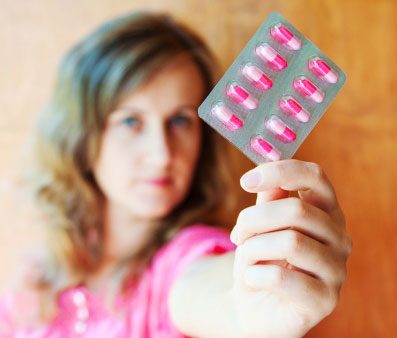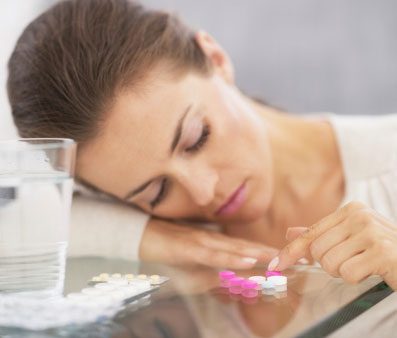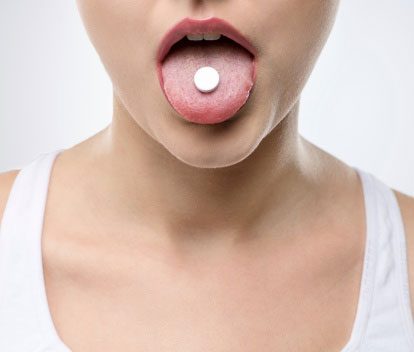
Over-the-counter painkillers
There are two types of over-the-counter painkillers, acetaminophen (sold under the brand name Tylenol) and Non-Steroidal Anti-Inflammatory Drugs (NSAIDs). The latter class includes ibuprofen, naproxen and acetylsalicylic acid (sold under brand names like Advil and Aleve).
And while we associate dangers with prescription painkillers, drugstore aisle painkillers aren’t benign. While Tylenol is “pretty mild and pretty safe,” according to Dr. Crosby, it can cause liver damage if taken improperly and therefore shouldn’t be taken with alcohol or by those who have liver disease. But Dr. Crosby especially worries about NSAIDS.
“The public thinks they’re so harmless,” he says. “But they can cause severe allergy and they can cause bleeding in your stomach.” Of course, these side effects are not a regular occurrence and generally, they occur with improper use. Those with certain stomach issues and other medical conditions shouldn’t take these drugs. Dr. Crosby recommends people always buy over-the-counter medications from a drug store (not a corner store) so they can talk to the pharmacist to ensure the drug is right for them.
Instead of popping a pill at the first sign of a small ache, try soothing pain with a hot water bottle, massage or warm bath.

Anti-anxiety/anti-insomnia medications
Recently, medical professionals have sounded the alarm about the overuse of benzodiazepines, a class of drugs used to treat anxiety and insomnia including Ativan, Xanax and Clonazepam. In Ontario alone, 4 million prescriptions for benzos are filled each year.
The problem? They’re highly addictive. “You try to come off them and you get really nervous or hyper,” says Dr. Crosby, who adds the withdrawal symptoms can last for weeks.
Dr. Crosby recommends anxious patients get exercise and reduce caffeine instead of turning to drugs. Exercise can help takes one’s mind off of problems and burns off anxiety-revving adrenalin. Caffeine, meanwhile, increases adrenaline.
While anti-anxiety meds may be required in acute and severe anxiety caused by an event like a death, for example, they should only be used short term, says Dr. Crosby. And patients should wean off them gradually, under a doctor’s supervision, to avoid serious withdrawal symptoms.

Decongestants
Decongestants won’t make your cold go away any faster; in fact, some doctors and naturopaths think they could prolong it by interfering with the body’s ‘flushing out’ mechanism.
When he gets a cold, Dr. Crosby goes the old-fashioned route: “lots of fluid and rest.” While many take a decongestant to avoid sniffling through a work meeting, Dr. Crosby recommends staying home altogether. “Don’t be that hero,” he says. “If you can, try to avoid exposing other people.”
As alternatives, humidifiers can help you breathe better when under the weather, while nasal irrigation may help clear mucus. Ask your doctor what might work for you.

Antibiotics
The physician-led campaign, Choosing Wisely Canada, was launched earlier this year to reduce the amount of unnecessary, and possibly harmful, tests and treatments in medicine. One of the recommendations of the campaign was that doctors should stop giving antibiotics to patients with sinusitis, which is almost always a viral infection that only goes away with time. Why do doctors prescribe antibiotics when they won’t work?
Patient pressure for a quick fix is a big part of it as patients increasingly request antibiotics from their physicians.
But, like many medications, antibiotics aren’t without side effects. As they target the ‘good’ bacteria, they can cause symptoms like diarrhea. Also, the overuse of antibiotics leads to antibiotic-resistant strains of bacteria in the wider populations, strains that are more difficult to treat.
So next time you’re prescribed antibiotics, it’s wise to ask if they’re really necessary, and if there’s any harm of waiting out to see if an infection goes away on its own.

Antidepressants
Antidepressants can be life-saving for people who have severe depression and suicidal thoughts. But these drugs aren’t the only option.
Dr. Crosby suggests speaking to your doctor about a healthy diet, exercising more and talking about concerns with friends, family, a counsellor or psychiatrist.
While antidepressants are “fairly safe,” according to Dr. Crosby, they do have side affects, which may include weight gain, constipation, sweating and sometimes, insomnia and anxiety. But those who want to go off antidepressants should do so gradually, with their doctor’s go ahead.
Related:
• Could your medication be harming your health?
• The best time of day to take your medication
• The best allergy medications and how to take them
